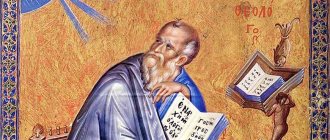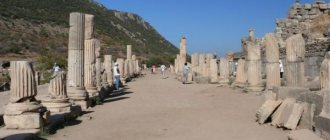Author.
The two books of Luke (the Gospel of Luke and the Book of Acts) make up 28 percent of the entire Greek New Testament. However, Luke himself is not mentioned by name in any of them. The only place where his name is mentioned is in Col. 4:14; 2 Tim. 4:11 and Philim. 24. Moreover, Luke is implied in those sections of the book of Acts where his narrative is in the first person plural. numbers (Acts 16:10-17; 20:5 - 21:18; 27:1 - 28:16).
Luke, in all likelihood, was not a Jew, judging by the way the Apostle Paul lists those who greeted them in his letter to the Colossians (Col. 4:10-14). Paul begins with Aristarchus, Mark and Jesus (Justus), stipulating that the last two were Jews (“circumcised”); Those who followed (Epaphras, Luke and Demas) were therefore pagans.
Paul calls Luke a doctor (Col. 4:14), and many have tried to confirm this by citing passages in Luke and the book of Acts.
According to tradition, Luke was from Antioch, but it is not possible to prove this based on facts.
Judging by Luke. 1:3, the evangelist acted as a historical researcher. Guided by his special goals, he carefully studied the material at his disposal. He talked with eyewitnesses of the events (1:2). And, apparently, he discovered a number of details related to the childhood and youth of Jesus Christ; perhaps he learned them from His mother Mary (2:51). It appears that Luke also had contacts at the court of King Herod (3:1,19; 8:3; 9:7-9; 13:31; 23:7-12).
There is no consensus among theologians about what sources Luke used when writing his Gospel. It appears that he reworked a number of materials available to him in order to create a single work in his own style and reflecting his intended purpose. All this, of course, was accomplished under the influence of the Holy Spirit.
As many have already begun to compose narratives about events that are completely known among us, as those who were from the very beginning eyewitnesses and ministers of the Word conveyed to us, it was decided for me, after a thorough examination of everything from the beginning, to describe to you in order, Venerable Theophilus, so that you would know the solid foundation the teaching in which he was instructed.
In the days of Herod, king of Judah, there was a priest from the order of Abius, named Zechariah, and his wife from the family of Aaron, her name was Elizabeth. Both of them were righteous before God, walking according to all the commandments and statutes of the Lord blamelessly. They had no children, for Elizabeth was barren, and both were already advanced in years.
One day, when he was serving before God in the order of his turn, by lot, as was usual with priests, he had the opportunity to enter the temple of the Lord for incense, and the whole multitude of people were praying outside during the incense, then the Angel of the Lord appeared to him, standing on his right side of the altar of incense. Zechariah, seeing him, was embarrassed, and fear attacked him.
The angel said to him: Do not be afraid, Zechariah, for your prayer has been heard, and your wife Elizabeth will bear you a son, and you will call his name John; and you will have joy and gladness, and many will rejoice at his birth, for he will be great before the Lord; He will not drink wine or strong drink, and will be filled with the Holy Spirit from his mother’s womb; and he will turn many of the children of Israel to the Lord their God; and he will go before Him in the spirit and power of Elijah, to restore the hearts of the fathers to the children, and to the disobedient to the minds of the righteous, to present to the Lord a prepared people.
And Zechariah said to the angel: By what means do I know this? for I am old, and my wife is advanced in years.
The angel answered him: I am Gabriel, who stands before God, and was sent to speak with you and bring this good news to you; and behold, you will remain silent and will not be able to speak until the day this happens, because you did not believe my words, which will come true in due time.
Meanwhile, the people were waiting for Zechariah and were amazed that he was delaying in the temple. He, having gone out, could not speak to them; and they understood that he had seen a vision in the temple; and he communicated with them by signs, and remained mute.
And when his days of service were ended, he returned to his home. After these days Elizabeth his wife conceived, and hid herself for five months and said: Thus did the Lord do for me in these days, in which he looked upon me, to remove from me the reproach of men.
In the sixth month the angel Gabriel was sent from God to the city of Galilee, called Nazareth, to a virgin betrothed to a husband named Joseph, from the house of David; The name of the Virgin is: Mary. The angel, entering her, said: Rejoice, full of grace! The Lord is with You; Blessed are You among women. When she saw him, she was embarrassed by his words and wondered what kind of greeting this would be.
And the Angel said to Her: Do not be afraid, Mary, for You have found favor with God; and behold, you will conceive in your womb and give birth to a Son, and you will call His name Jesus. He will be great and will be called the Son of the Most High, and the Lord God will give Him the throne of His father David; and He will reign over the house of Jacob forever, and His kingdom will have no end.
Mary said to the Angel: How will this be when I don’t know my husband?
The angel answered Her: The Holy Spirit will come upon You, and the power of the Most High will overshadow You; therefore the Holy One who is to be born will be called the Son of God. Here is Elizabeth, Your relative, who is called barren, and she conceived a son in her old age, and she is already in her sixth month, for with God no word will remain powerless.
Then Mary said: Behold, the Servant of the Lord; let it be done to me according to your word. And the Angel departed from Her.
And Mary arose in those days, and went with haste to the hill country, to the city of Judah, and entered the house of Zechariah, and greeted Elizabeth. When Elizabeth heard Mary's greeting, the baby in her womb leaped; and Elizabeth was filled with the Holy Spirit, and cried with a loud voice, and said: Blessed are You among women, and blessed is the fruit of Your womb! And where does it come from for me that the Mother of my Lord came to me? For when the voice of Your greeting reached my ears, the baby leaped joyfully in my womb. And blessed is she who believed, because what was spoken to her by the Lord will be fulfilled.
And Mary said: My soul magnifies the Lord, and My spirit rejoices in God My Savior, because He has respected the lowliness of His Servant, for from now on all generations will bless Me; that the Mighty One has done great things for Me, and holy is His name; and His mercy throughout all generations is upon those who fear Him; He showed the strength of His arm; He scattered the proud in the thoughts of their hearts; He has cast down the mighty from their thrones and exalted the humble; He filled the hungry with good things, and sent away the rich with nothing; He received His servant Israel, remembering mercy, as He spoke to our fathers, toward Abraham and his seed forever.
Mary stayed with her for about three months and returned to her home.
The time came for Elizabeth to give birth, and she gave birth to a son. And her neighbors and relatives heard that the Lord had magnified His mercy over her, and they rejoiced with her.
On the eighth day they came to circumcise the baby and wanted to name him, after his father’s name, Zechariah. To this his mother said: no, but call him John.
And they said to her: There is no one in your family who is called by this name. And they asked his father by signs what he would like to call him.
He demanded a tablet and wrote: “His name is John.” And everyone was surprised. And immediately his mouth and his tongue loosened, and he began to speak, blessing God. And there was fear on all those living around them; and they told about all this throughout the entire hill country of Judea. All who heard it laid it on their hearts and said: What will happen to this child? And the hand of the Lord was with him.
And Zechariah his father was filled with the Holy Spirit and prophesied, saying: Blessed be the Lord God of Israel, that he hath visited his people, and hath made deliverance unto them, and hath raised up a horn of salvation for us in the house of his servant David, as he hath declared by the mouth of his holy prophets that have been of old, that will save us from our enemies and from the hand of all those who hate us; He will show mercy to our fathers and remember His holy covenant, the oath which He swore to Abraham our father, to give us, without fear, after being delivered from the hand of our enemies, to serve Him in holiness and righteousness before Him all the days of our life.
And you, baby, will be called the prophet of the Most High, for you will go before the face of the Lord to prepare His ways, to make His people understand salvation in the forgiveness of their sins, according to the gracious mercy of our God, with which the East from above visited us, to enlighten those sitting in darkness and the shadow of death, to guide their feet ours on the path of peace.
The child grew and became strong in spirit, and was in the desert until the day of his appearance to Israel.
Place and time of writing.
If we assume that the book of the Acts of the Apostles was written before the beginning of the persecution of Christians unleashed by Nero in 64 A.D. (which, apparently, is evidenced by the fact that it ends with the stay of the Apostle Paul, still alive , imprisoned in Rome), then the Gospel of Luke should have been written several years earlier, since the book of Acts seems to follow from it. And therefore, in the absence of accurate data on this matter, we can assume that the Gospel was written between 58 and 60 years.
Luke has no indication of where his Gospel was written. So any assumptions on this matter come down to guesswork. According to some, it was written in Caesarea or Rome.
Gospel Song
The Gospel of Luke can be sung. Of course, not the entire text, but some parts of it are possible. By the way, this is exactly what happens at almost every service. If you come to the church for the all-night vigil, which takes place on Saturday evening, and stay until the end, you can hear the choir, and often the whole people, singing fragments of the third Gospel.
First, we will hear the prayer of the righteous Simeon, who met the Infant Christ in the Temple of Jerusalem: Now, Lord, you are releasing Your servant, according to Your word, in peace, for mine eyes have seen Your salvation, which You have prepared before the face of all nations, a light for the enlightenment of the Gentiles and the glory of the people. Your Israel (Luke 2 :29–32). Then - the solemn praise of the Angels, who announced to the Bethlehem shepherds about the birth of the Savior: glory to God in the highest, and on earth peace, good will towards men! (Luke 2:14 ). The angelic doxology will be repeated once again at the end of the vigil. The touching Song of the Mother of God - My soul magnifies the Lord (see: Luke 1 , 46-55) - is accompanied by censing of the entire temple. The fragrant smoke of incense is a symbol of God's grace. Each believer, together with the Blessed Virgin, sings a song of gratitude to God for the accomplished salvation. Another hymn that can be heard in churches during Lent is the song of Zechariah, the father of the holy Forerunner and Baptist of the Lord John: Blessed is the Lord God of Israel, who has visited His people and created deliverance for them, and has raised a horn of salvation for us in the house of David, the youth His own (Luke 1: 68–69).
Purpose of writing.
Luke had two purposes in writing this book. The first was to strengthen the faith of one Theophilus by showing him that his faith in Christ rested on historical fact (1:3-4). Luke's second purpose was to present Jesus Christ as the Son of Man who was rejected by Israel. And to show that thanks to this rejection, Jesus was preached to the pagans, so that they too could learn about the Kingdom of God and receive salvation.
The book is aimed at pagans. This is evidenced by several points. First. Luke often accompanies the mention of geographical points in Judea with explanations of their location (4:31; 8:26; 21:37; 23:51; 24:13). If he were addressing Jewish readers, there would be no need for this.
Second. He traces the genealogy of Jesus (3:23-28) to Adam, and not to Abraham, as Matthew did, apparently to show that Christ belongs to all humanity, and not just to the Jewish people. Third. Speaking about the time of the birth of Christ (2:1) and the beginning of the preaching ministry of John the Baptist (3:1), Luke refers in this regard to the Roman emperors and rulers of those days. Fourth. The evangelist resorts to a whole series of words that were more familiar to pagan readers than the corresponding Jewish terminology (we will not find this, for example, in the Gospel of Matthew). Thus, he calls “teacher” not the Jewish “rabbi”, but the Greek didaskalos.
Fifth. When quoting from the Old Testament, Luke uses the Septuagint. At the same time, he does not have many direct quotes, although his book is full of hints and references. Quotes and references are found in 2:23-24; 3:4-6; 4:4,8,10-12,18-19; 7:27; 10:27; 18:20; 19:46; 20:17,28,37,42-43; 22:37. All of them, with the exception of 7:27, are taken from the Septuagint. As for 7:27, these words are not from it and not from the Hebrew Masoretic text, but from some other (unexplained) one. Sixth.
Luke has relatively little to say about the fulfillment of prophecies in Jesus, since this topic was not as important to the Gentiles as it was to the Jews. Luke refers to the fulfillment of Old Testament prophecies only five times, and all the corresponding quotations, except one (3:4), were put into the mouth of Christ, who spoke to the Israelites.
Gospel of Repentance
The theme of repentance, begun by the sermon of St. John the Baptist, is heard throughout the entire Gospel of Luke. And this reveals another most important liturgical meaning of this Gospel. Four weeks before the beginning of Great Lent, on Sundays, we hear in churches readings from the Gospel of Luke: about the publican Zacchaeus, the parables of the publican and the Pharisee, about the prodigal son.
Publicans are tax collectors, hated by everyone. Why were publicans hated? Taxes were collected in favor of the Roman power - the power of invaders and enslavers. Therefore, the publican was perceived as a traitor. But often the tax collectors took more than they were supposed to, simply robbing their fellows. The author of the first Gospel, the Apostle Matthew, was a tax collector. Hearing the call of Christ, Matthew left everything and followed the Lord (see: Matthew 9 :9). Evangelist Luke talks about another repentant publican, Zacchaeus. Imagine how Zacchaeus, a short man, climbs a tree to see Christ passing - something made him forget his position as the chief of tax collectors and a rich man (cf. Luke 19 :2). Christ saw Zacchaeus and entered his house to announce that now salvation had come to this house, because he too was the son of Abraham (Luke 19 :9). The Jews considered themselves descendants of Abraham, with whom God made a Covenant. Christ addresses his words not only to Zacchaeus, but to everyone: the sinner you despise is also the son of Abraham - your brother, why do you hate your brother? Zacchaeus promises Christ: Lord! I will give half of my property to the poor, and if I have offended anyone, I will repay him fourfold (Luke 19 :8).
The parable of the publican and the Pharisee... The first does not dare to raise his eyes to heaven, but, striking himself on the chest, says: God! be merciful to me, a sinner! (cf. Luke 18:13 ). The Pharisee, on the contrary, standing in front, thanks God for the fact that he is not like other people, robbers, offenders, adulterers, or like this tax collector (Luke 18:11 ). But the publican went to his house justified more than the Pharisee, for everyone who exalts himself will be humbled, and he who humbles himself will be exalted (Luke 18:14 ). It is not pride that elevates a person before God, but humility associated with repentance. The publican asked for nothing else, but only mercy...
The parable of the prodigal son (see: Luke 15 , 11-32) is a real pearl of the third Gospel. St. Ambrose of Milan, a great saint of the 4th century, called the parable of the prodigal son the Gospel within the Gospel. Father! I have sinned against heaven and before you and am no longer worthy to be called your son (Luke 15 :18-19) - we hear the words of the prodigal son, who left his father’s house and squandered his property. These are words of repentance. We do not hear a single word of reproach from the lips of a loving father, who waited every day for his son’s return. The father’s words are amazing: bring the best clothes and dress him, and put a ring on his hand and shoes on his feet; and bring the fatted calf, and kill it; Let's eat and have fun! for this son of mine was dead and is alive again, he was lost and is found (Luke 15 :22-24). Repentance becomes for the prodigal son a new birth, a resurrection from sinful death, a return to life with a loving father. Zacchaeus was saved, the publican was justified, the prodigal son was dead and came to life. Does each of us seek salvation, justification and resurrection to a new life?
The relationship between the Gospels of Luke, Matthew and Mark.
Luke's narrative is one of the synoptic Gospels, which has much in common in content with the Gospels of Matthew and Mark. However, Luke has a long section (9:51 - 19:27) whose material is unique. In addition, only in Luke do we find stories about the birth of John the Baptist and Jesus Christ, as well as an incident from His childhood, when He was 12 years old (1:5 - 2:52).
This suggests that Luke was familiar with the other two synoptic gospels and used either them or the same sources used by Matthew and Mark. Some differences in the sequence of events presented by the three evangelists can be explained by the different goals that they set for themselves. Although they all describe the same historical events, each had its own special theological purpose.
Features of the Gospel of Luke.
1. Luke, more than other evangelists, emphasizes the universality of the Gospel of Christ. He writes a lot about sinners, the poor and the outcasts of Jewish society. In addition, he often emphasizes that the pagans also inherit God's blessings in Christ. He presents the Samaritans as willing to believe in the Messiah. The Gospel of Luke says a lot about women and children and their faith.
2. This Gospel gives a broader historical overview than others of the time in which Christ lived. And from the first years of Christ's life, Luke gives more facts than Matthew, Mark or John.
3. Luke places particular emphasis on the need to forgive (3:3; 5:8-26; 6:37; 7:36-50; 11:4; 12:10; 17:3-4; 23:34; 24: 47).
4. Luke emphasizes the importance of prayer. In his account, Jesus makes particular use of it in His ministry (3:21; 5:16; 6:12; 9:18,29; 22:32,40-41).
5. This evangelist talks a lot about the need for personal repentance before God for everyone who wants to follow Christ. Examples of this are Zechariah, Elizabeth, Mary, Simeon, Anna, Martha, Mary, Simon, Levi, the centurion, the widow of Nain, Zacchaeus and Joseph from Arimathea.
6. More than any other New Testament author, Luke talks about money and material possessions. He does not argue, however, that all poor people are righteous, but he emphasizes that the self-righteous rich, who value wealth above Jesus Christ, cannot accept the salvation Christ offers.
7. The leitmotif in the Gospel of Luke is joy; a feeling of joy accompanies his words (direct and allegorical) about faith (1:14; 8:13; 10:17; 13:17; 15:5,9,32; 19:6,37).
Bible Online
1As many have already begun to compose narratives about events that are completely known among us,
2 As they who from the very beginning were eyewitnesses and ministers of the Word conveyed it to us,
3 Then it was decided for me, after carefully examining everything first, to describe to you in order, venerable Theophilus,
4 that you may know the sure foundation of the doctrine in which you have been instructed.
5 In the days of Herod king of Judah, there was a priest from the order of Abius, whose name was Zechariah, and his wife, from the family of Aaron, whose name was Elizabeth.
6 They were both righteous before God, walking in all the commandments and statutes of the Lord blamelessly.
7 They had no children, for Elizabeth was barren, and both were already advanced in years.
8 One day, while he was ministering before God in the order of his turn,
9 By lot, as was usual among the priests, he was to enter the temple of the Lord to burn incense,
10 And all the multitude of people were praying outside during the incense burning,
11 Then the angel of the Lord appeared to him, standing on the right side of the altar of incense.
12 When Zechariah saw him, he was troubled, and fear came over him.
13 The angel said to him, “Do not be afraid, Zechariah, for your prayer has been heard, and your wife Elizabeth will bear you a son, and you will call his name John.”
14 And you will have joy and gladness, and many will rejoice at his birth,
15 For he will be great before the Lord; He will not drink wine or strong drink, and will be filled with the Holy Spirit from his mother’s womb;
16 And he will turn many of the children of Israel to the Lord their God;
17 And he will go before Him in the spirit and power of Elijah, to restore the hearts of the fathers to the children, and the disobedient to the minds of the righteous, to present to the Lord a prepared people.
18 And Zechariah said to the angel, By what will I know this? for I am old, and my wife is advanced in years.
19 The angel answered and said to him: I am Gabriel, who stands before God, and was sent to speak with you and bring this good news to you;
20 And behold, you will remain silent and will not be able to speak until the day when these things come to pass, because you did not believe my words, which will come to pass in due time.
21 Meanwhile the people were waiting for Zechariah and were amazed that he was lingering in the temple.
22 But when he went out, he could not speak to them; and they understood that he had seen a vision in the temple; and he communicated with them by signs, and remained mute.
23 And when his days of service were ended, he returned to his house.
24 After these days Elizabeth his wife conceived, and hid herself for five months, and said:
25 Thus did the Lord do for me in these days, in which he looked upon me, to remove from me the reproach of men.
26 And in the sixth month the angel Gabriel was sent from God to a city of Galilee called Nazareth,
27 to a virgin betrothed to a man named Joseph, of the house of David; The name of the Virgin is: Mary.
28 The angel came to her and said: Rejoice, full of grace! The Lord is with You; Blessed are You among women.
29 But when she saw him, she was troubled by his words and wondered what kind of greeting this would be.
30 And the Angel said to Her: Do not be afraid, Mary, for You have found favor with God;
31 And behold, you will conceive in your womb and give birth to a Son, and you will call His name Jesus.
32 He will be great and will be called the Son of the Most High, and the Lord God will give him the throne of His father David;
33 And he will reign over the house of Jacob forever, and his kingdom will have no end.
34 And Mary said to the angel: How will this be, since I do not know the husband?
35 The angel answered and said to her: The Holy Spirit will come upon you, and the power of the Most High will overshadow you; therefore the Holy One who is to be born will be called the Son of God.
36 Behold your relative Elizabeth, who is called barren, and she conceived a son in her old age, and she is now in her sixth month,
37 For with God no word will fail.
38 Then Mary said, Behold, the handmaid of the Lord; let it be done to me according to your word. And the Angel departed from Her.
39 And Mary arose in those days, and went with haste into the hill country, to the city of Judah,
40 And she went into Zechariah's house and greeted Elizabeth.
41 When Elizabeth heard Mary’s greeting, the child in her womb leaped; and Elizabeth was filled with the Holy Spirit,
42 And she cried with a loud voice and said, Blessed are You among women, and blessed is the fruit of Your womb!
43 And where do I come from, that the Mother of my Lord came to me?
44 For when the voice of Your greeting reached my ears, the baby leaped joyfully in my womb.
45 And blessed is she who believed, for what was spoken to her by the Lord will be fulfilled.
46 And Mary said, My soul magnifies the Lord,
47 And my spirit rejoiced in God my Savior,
48 that He looked upon the humility of His Servant, for from now on all generations will please Me;
49 that the Mighty One has done great things for me, and holy is His name;
50 And His mercy endureth unto all generations unto them that fear Him;
51 He showed the strength of His arm; He scattered the proud in the thoughts of their hearts;
52 He brought down the mighty from their thrones, and exalted the humble;
53 He filled the hungry with good things, and sent the rich away empty;
54 He received His servant Israel, remembering mercy,
55 as he spoke to our fathers, to Abraham and his seed forever.
56 And Mary stayed with her about three months, and returned to her house.
57 Now the time came for Elizabeth to give birth, and she gave birth to a son.
58 And her neighbors and relatives heard that the Lord had magnified His mercy toward her, and they rejoiced with her.
59 On the eighth day they came to circumcise the child and wanted to name him, after his father’s name, Zechariah.
60 To this his mother said, “No, but call him John.”
61 And they said to her, There is no one in your kindred who is called by this name.
62 And they asked his father by signs what he would like to call him.
63 He demanded a tablet and wrote: John is his name. And everyone was surprised.
64 And immediately his mouth and his tongue loosened, and he began to speak, blessing God.
65 And there was fear on all those living around them; and they told about all this throughout the hill country of Judea.
66 All who heard it laid it on their hearts and said, “What will happen to this child?” And the hand of the Lord was with him.
67 And Zechariah his father was filled with the Holy Spirit and prophesied, saying:
68 Blessed be the Lord God of Israel, that he hath visited his people, and brought deliverance unto them,
69 And he raised up a horn of salvation for us in the house of his servant David,
70 as He declared by the mouth of His holy prophets who have been since the ages,
71 that will save us from our enemies and from the hand of all those who hate us;
72 He will show mercy to our fathers and remember His holy covenant,
73 the oath which He swore to Abraham our father to give us,
74 without fear, after being delivered from the hand of our enemies,
75 to serve Him in holiness and righteousness before Him all the days of our life.
76 And you, little child, will be called a prophet of the Most High, for you will go before the face of the Lord to prepare His ways,
77 to make His people understand His salvation through the forgiveness of their sins,
78 according to the gracious mercy of our God, by which the East from above visited us,
79 to enlighten those who sit in darkness and in the shadow of death, to guide our feet into the path of peace.
80 And the child grew and became strong in spirit, and was in the wilderness until the day of his appearing to Israel.







